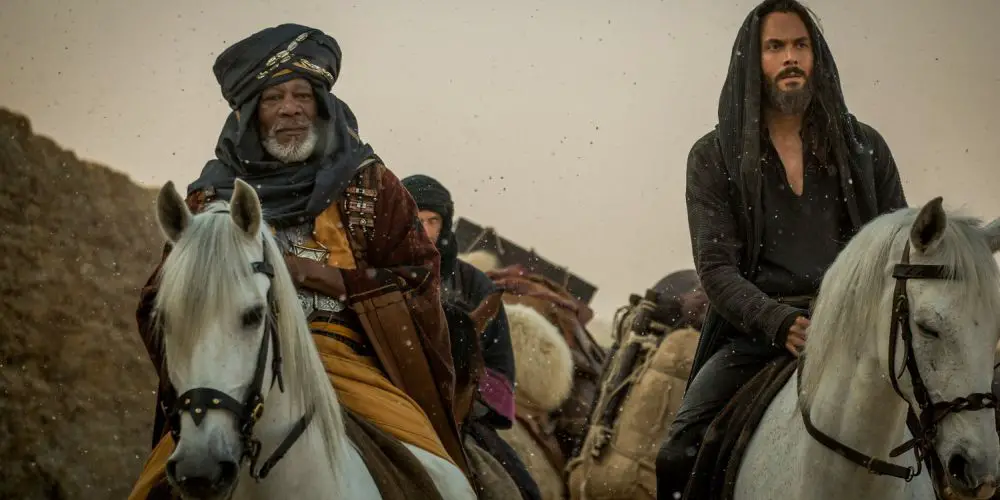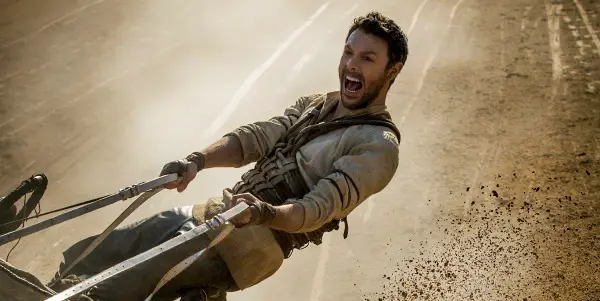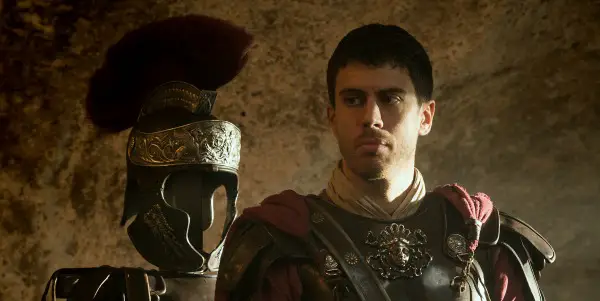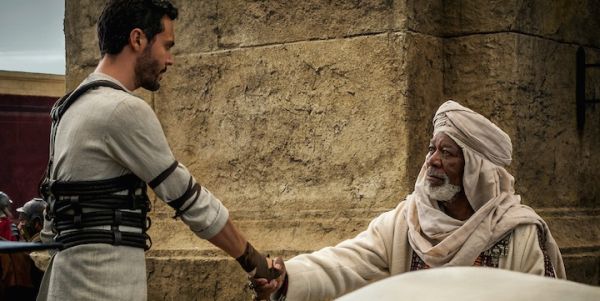BEN-HUR: Or How Hollywood Forgot How To Make Epics

Jim Dixon retired from practicing law not a moment too…
Ben-Hur actually opens with the horses getting ready to bolt from the gates for the chariot race. That will seem heretical to audiences familiar with the Academy Award winning 1959 version of the story. Younger moviegoers may not even realize this is a remake, and may not even realize that the phrase “chariot race” used to refer to a big movie’s big action climax.
But the fact remains that this latest version of Ben-Hur pretty much proves that whenever the audience hears the phrase “a visionary director’s re-imagining” they should say “Check, please” and bolt for the nearest exit. If a good movie, or maybe even particularly a great movie, is being remade, the question ought to be why.
Shorter, streamlined and savage
The answer here seems to be to make a shorter, streamlined but more savage, version of the story. Directed by Timur Bekmambetov (Wanted, Abraham Lincoln: Vampire Hunter), not a director known for complex, nuanced characterizations, the latest version of Ben-Hur feels like a Gladiator rip-off without star power, depth or even sheer spectacle.
Ben-Hur is the epic story of Judah Ben-Hur, the son of a wealthy, noble Jewish family in ancient Judea during the Roman occupation. Betrayed and falsely accused of sedition by Messala, a Roman boyhood friend, Judah is condemned to life as a galley slave. Circumstances reverse his fortunes, and he returns to Jerusalem to find out the fates of his mother and sister, and to seek revenge against Messala, culminating in a no-holds barred chariot race, during which murder is legal.
Judah encounters Christ more than once during his adventures, [spoiler alert] whose example of compassion, forgiveness and mercy ultimately inspires Judah.
Has Hollywood Forgotten How to Craft an Epic?
The epic has been big – no pun intended – in Hollywood since the days of DeMille. Sadly, modern Hollywood seems to have largely forgotten how it’s done. Epics trade in size, both in visual scale and length. William Wyler’s 1959 Ben-Hur ran 3 hours and 44 minutes. Bekmambetov’s runs a non-attention span challenging 2 hours and 4 minutes.
It should go without saying that no story can survive cuts that deep. You’d be inclined to think that this is a Spark Notes version of the story, but you’d actually be wrong. The new version actually feels longer – no mean feat – and although indeed a lot of material has hit the shredder, the filmmakers have made the mistake of adding material of their own under the delusion that they’re adding depth.

In a stunningly unnecessary but very Hollywood touch, Judah’s foil Messala is not just a boyhood friend, but actually an adopted brother. So to be clear, a noble and very wealthy Jewish family, living in Judea under Roman occupation, adopted a Roman baby? No, it doesn’t make much sense. John Ridley, who won an Academy Award for his adaptation of 12 Years a Slave, co-wrote this, but admirers of that movie will be scratching their heads looking for signs of his involvement.
Voice-over narration, arguably inherently uncinematic, is used frequently when the drastically slashed running time won’t support the story. Ben-Hur was always conceived of as an epic story, and sorry, but epics are long. Take it up with Homer.
Judah explains, via a letter to Messala, how he couldn’t let his slave Esther (Nazanin Boniadi) go off to marry another man. It’s just a lazy device to get from A to B. In the 1959 version, Charlton Heston and Haya Harareet used their faces while ostensibly talking about anything but their feelings, and the result had far more emotional content.
Plot Changes Dictated by Plot Cuts
In other instances, plot changes are dictated by the massive cuts to the story. Since we’ve cut the entire section where Judah saves a Roman consul during a sea battle, resulting in his becoming a citizen of Rome and learning charioteering, Judah has to wash ashore without a protector. He must return to Judea as a fugitive from Roman justice who’s going to drive in a chariot race without ever having taken a lesson.
To some degree all plots are house of cards, and you can only rearrange supporting pieces so far before everything collapses. With Ben-Hur, it all has to lead up to a chariot race and crucifixion, but by cutting this much of the story that goes in front of them, the logic that led up to them is eviscerated.
Huston No Match for Heston
Jack Huston actually seems, not to be unkind, smaller than life here. Charlton Heston, who virtually oozed star power, played the part in the best-known movie version, and won an Oscar for it. At six foot three, with a face that looked as though it had been carved from marble by Michelangelo, Heston was a was a natural for heroic roles, and his voice could make any line of dialogue sound like scripture or Shakespeare. Huston is an appealing young actor, but the sandals he’s trying to fill are too big. He’s competent and sincere, but is no match for Heston’s towering gravitas and sheer screen presence.

Toby Kebbell, as Judah’s former friend and later enemy Messala, gives an intelligent performance which errs on the side of sensitivity. This script is determined to flesh the Roman out, and it isn’t in the movie’s best interests. A villain is sometimes allowed to be a villain, but this Messala wants to take a gentler approach with the occupied Judeans, even the insurgent Zealots. Of course this provides dramatic irony when he condemns his foster brother to the galleys, but it’s an irony the movie didn’t need.
To make matters worse, all the new material is silly and unlikely. Messala, who was perfectly believable as a boyhood friend who was probably the son of a Roman officer or occupation official, is far less so as an adopted brother. Here, he runs away to join the Roman Legions as a private and returns as an officer – not likely now and not likely then.
Morgan Freeman, as the sheik who gives Judah the means to enter the big chariot race, is saddled with remarkably unflattering gray dreadlocks, and perhaps crushed by their weight, phones it in. The Oscar winner doesn’t just underplay but delivers every line in an unwavering monotone. By contrast, Hugh Griffith was incendiary in the same role in the 1959 version.
Lip Service to Religious Themes
Roma Downey’s presence as an executive producer would lead an audience to expect a Sunday School evangelism to be front and center. Oddly,there’s no real religiosity at all here. Although the new version pays lip service to the theme of forgiveness and redemption, make no mistake: this movie is first and foremost about violence, revenge and man’s cruelty to man.
The novel which is the basis of all the movie versions of Ben-Hur is “Ben-Hur: A Tale of the Christ”, by General Lew Wallace. The best-known version of Ben-Hur, director William Wyler’s 1959, technicolor extravaganza which starred Charlton Heston, itself a remake, opens with a Christmas card-gorgeous recreation of the Nativity, which sets up the premise that the main character’s destiny is intertwined with that of Jesus Christ.
That is not the case in this 2016 remake. Although Rodrigo Santoro (Jane Got a Gun, Focus) is third-billed as Jesus, and the character actually has more screen time than in the 1959 version, his impact in the movie is negligible.
Wallace, when he wrote the novel, took pains to not give any dialogue to Jesus that didn’t come straight from the gospels, the sole exception being the scene in which Jesus gives water to Judah when he’s being led off to the galleys. Almost all of Jesus’ dialogue here is original, and none of it is an improvement on the original. When Jesus actually utters a Biblical line, “Father, forgive them, for they know not what they do,” it seems startlingly out of place.

Claude Heater, uncredited as Jesus in the 1959 version, generated a far more powerful onscreen presence without dialogue and without showing his face. Bekmambetov clearly wants a more human Christ who isn’t instantly recognized as significant, but it doesn’t feed the story’s needs.
Too Much Dust Makes Stunts Hard to See
Wyler’s version was shot for a then unheard of budget of more than fifteen million dollars on the biggest sets ever constructed in M-G-M Camera 65, essentially a 70 millimeter negative. This remake seems small by comparison. Bekmambetov’s direction, generally over-kinetic to a fault, is unimaginative and actually dull and static during the interminable dialogue scenes.
He’s largely content to imitate Spielberg and Ridley Scott in the action scenes, right down to the 45 degree shutter cinematography which was almost revolutionary in Saving Private Ryan, but seems derivative here.
The chariot race, spectacular in the 1925 silent version and simply one of the best action sequences ever done in the 1959, has not been improved by augmenting the stunts with CGI. The dust raised by the horses actually obscures some stunts, and the subjective camera angles, presumably used to provide a Hardcore Henry vibe, make some of the action difficult to follow. A Roman naval battle, the one major sequence improved by modern special effects, is shot largely from below deck.
Conclusion
The big budget, costume epic might be due for a comeback, but this anemic and unimaginative exercise isn’t going to do it. Whether the shorter running time was designed to accommodate shrinking attention spans or provide more showings per day, the result is a not tighter story, simply a less logical one.
Bekmambetov’s over-adrenalized direction isn’t hip, it just looks amateurish next Wyler’s. This is one remake that would have benefited from an old school approach, assuming one thinks it should have been remade at all.
What do you think? When it comes to making Biblical epics, is old school better? Should the filmmakers have left well enough alone?
Ben-Hur is now playing in the United States and opens September 7, 2016, in the United Kingdom. Find international release dates here.
Does content like this matter to you?
Become a Member and support film journalism. Unlock access to all of Film Inquiry`s great articles. Join a community of like-minded readers who are passionate about cinema - get access to our private members Network, give back to independent filmmakers, and more.
Jim Dixon retired from practicing law not a moment too soon, and now works as a freelance writer and film critic. A lifelong and unrepentant movie geek, he firmly believes that everything you need to know in life you can learn at the movies. He lives in upstate New York.













